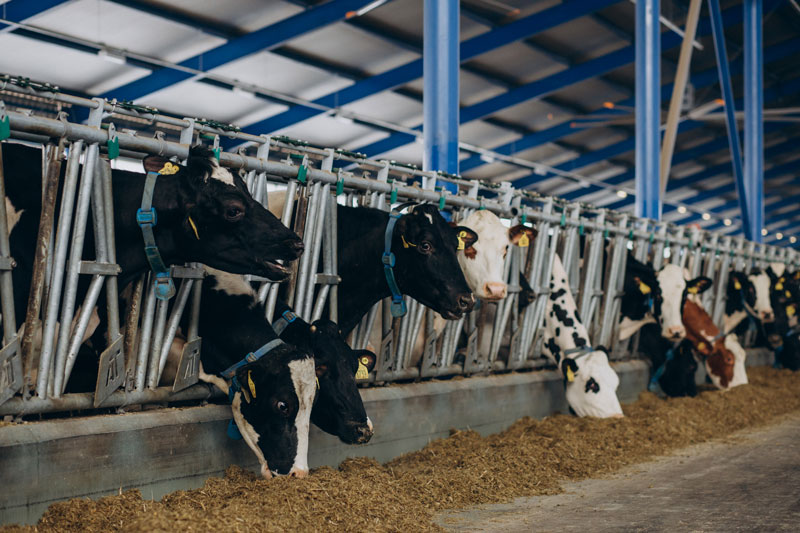
2025/01/16
CIC bioGUNE joins DIVAVACEHD project to develop a vaccine against Epizootic Hemorrhagic Disease (EHD) in cattle
CIC bioGUNE is involved in DIVAVACEHD, a collaborative project aimed at developing an effective vaccine against Epizootic Hemorrhagic Disease (EHD) in cattle using CRISBio® technology.
The center will carry out advanced structural studies with cryo-electron microscopy to ensure the vaccine's effectiveness.
The project, which brings together leading entities in biotechnology and animal health, is co-financed by European funds and CDTI.
CIC bioGUNE has joined the innovative DIVAVACEHD project, as coordinator of the ‘TransMisiones 2024 initiative’ for the Agencia Estatal de Investigación (AEI). DIVAVACEHD is a collaboration between six leading entities in biotechnology and animal health: ALGENEX, BIOGÉNESIS BAGÓ, PROALT, LABORATORIOS FARMALAN, CISA-INIA, CSIC, and CIC bioGUNE, member of BRTA. The project's goal is to develop an effective vaccine against the Epizootic Hemorrhagic Disease Virus (EHDV) affecting cattle, utilizing the advanced CRISBio® technology.
Epizootic Hemorrhagic Disease (EHD) is a viral disease that primarily affects cattle and is caused by the Epizootic Hemorrhagic Disease Virus (EHDV). The disease can lead to severe symptoms, including fever, swelling, and hemorrhaging, and in some cases, it can be fatal. EHD has significant economic consequences, especially in regions where cattle farming is a major industry. There is no specific treatment for EHD, which makes the development of a vaccine crucial for controlling its spread and reducing its impact on livestock populations.
In this consortium, the Structure and Cell Biology of Viruses laboratory at CIC bioGUNE, whose leader is Dr. Nicola G.A. Abrescia, Ikerbasque Professor, is responsible for conducting advanced structural studies using cryo-electron microscopy. This technique allows for the analysis of the antigenic conformation of the EHDV virus, ensuring its proper interaction with neutralizing antibodies that will guarantee the vaccine's effectiveness. Indeed, this laboratory has pioneered structural virology investigations, aiming at understanding the molecular mechanisms driving viral pathogenesis. Current efforts focus on virus assembly, viral entry into cells, and virus-antibody interactions, employing state-of-the-art electron microscopy alongside functional assays.
In addition, DIVAVACEHD brings together entities with expertise in various fields. ALGENEX leads the production of the vaccine antigen using its CrisBio® technology and optimizes manufacturing processes at an industrial scale. BIOGÉNESIS BAGÓ handles clinical trials, formulation optimization, and the preparation of regulatory documentation for EMA approval. PROALT develops monoclonal antibodies and analytical tools to ensure the vaccine's quality, while FARMALAN ensures its stability and packaging according to GMP standards.
Additionally, CISA-INIA, CSIC leads the studies on immune response and virus neutralization, providing essential data for clinical trials.
The outcome of this project will be a safe, effective, and stable vaccine that will help control the spread of EHDV in cattle, reducing the economic losses associated with the disease and improving animal health worldwide. This scientific and technological advance also represents an important step toward more sustainable livestock farming and protection against emerging diseases.
The DIVAVACEHD project is supported by the Centre for the Development of Industrial Technology (CDTI) and co-funded with European funds from the Recovery and Resilience Mechanism, under the TRANSMISSIONES 2024 program, part of the State Plan for Scientific, Technical, and Innovation Research 2024-2027.
Photograph by: © Designed by Freepik. Cows and bulls at cowshed on the farm.
About CIC bioGUNE
The Centre for Cooperative Research in Biosciences (CIC bioGUNE), member of the Basque Research & Technology Alliance (BRTA), located in the Bizkaia Technology Park, is a biomedical research organisation conducting cutting-edge research at the interface between structural, molecular and cell biology, with a particular focus on generating knowledge on the molecular bases of disease, for use in the development of new diagnostic methods and advanced therapies.
About Ikerbasque
Ikerbasque - Basque Foundation for Science - is the result of an initiative of the Department of Education of the Basque Government that aims to reinforce the commitment to scientific research by attracting, recovering and consolidating excellent researchers from all over the world. Currently, it is a consolidated organization that has 290 researchers/s, who develop their work in all fields of knowledge.
About BRTA
BRTA is an alliance of 4 collaborative research centres (CIC bioGUNE, CIC nanoGUNE, CIC biomaGUNE y CIC energiGUNE) and 13 technology centres (Azterlan, Azti, Ceit, Cidetec, Gaiker, Ideko, Ikerlan, Leartiker, Lortek, Neiker, Tecnalia, Tekniker y Vicomtech) with the main objective of developing advanced technological solutions for the Basque corporate fabric.
With the support of the Basque Government, the SPRI Group and the Provincial Councils of the three territories, the alliance seeks to promote collaboration between the research centres, strengthen the conditions to generate and transfer knowledge to companies, contributing to their competitiveness and outspreading the Basque scientific-technological capacity abroad.
BRTA has a workforce of 3,500 professionals, executes 22% of the Basque Country's R&D investment, registers an annual turnover of more than 300 million euros and generates 100 European and international patents per year.

See a large version of the first picture





